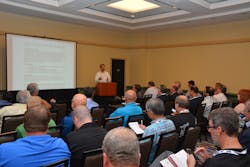How to remain mainstream in your field
Repairing heavy duty equipment has become a more complex process in the last decade, with intricate technology becoming ingrained in every system of the vehicle. To stay on top of today’s equipment maintenance – and to prepare for future technology – shop managers need to take every opportunity to train, read manuals and network with their peers.
One effective way to tame the demanding maintenance beast while keeping an eye on the future, is to become a member of the Technology & Maintenance Council (TMC). TMC’s 2,300+ members include technicians, educators, suppliers, OEMs and fleet maintenance professionals.
TMC members are responsible for the maintenance of more than 1.5 million pieces of equipment across North America and they have relied on the TMC for 60 years to keep their trucks in top working order and their operations on budget.
Council members participate in 15 diverse Study Groups that cover maintenance and engineering issues in all the systems of heavy duty vehicles. TMC’s Study Groups encompass more than 100 Task Forces whose volunteer members identify and recommend industry standards.
RPs
The result of the Council’s Study Group and Task Force work is an endless source of information about truck equipment maintenance, shop management and spec’ing, entitled TMC’s 2016-2017 Recommended Practices Manual.
TMC’s Recommended Practices (RPs) are available online to members and on a searchable compact disk – a handy feature since there are more than 450 individual RPs, many with illustrations. While much of the RP development is accomplished during TMC meetings held twice a year, members also have 24-7 access to TMC Connect (http://TMCConnect.trucking.org), an online collaborative platform which includes a searchable RP Library.
Along with the committee work, each TMC meeting features in-depth educational sessions that cover the major issues of today and tomorrow.
TMC RPs break down difficult repairs – such as the heavy duty exhaust or regeneration system – into digestible portions. For example, individual RPs under Study Group 3 (S-3) Engines provide a roadmap of preventative maintenance procedures for diesel particulate filters (DPFs) (see RP 355A), as well as guidelines for selective catalytic reduction (SCR) technology and its use of diesel exhaust fluid (DEF) (see RP 360).
Broad Range of Subjects
TMC’s RPs also simplify a maze of terms and dashboard codes for its user network. Today’s heavy duty equipment includes multiple computer components and the RPs don’t shy away from addressing the most complicated systems while keeping an eye on future technologies and advancements. Recent RPs have addressed a multitude of equipment maintenance issues related to brakes, lighting systems, onboard vehicle electronics and corrosion, to name a few.
As the industry’s trailblazers in “Thought Leadership,” TMC continues to work with OEMs to create standards that ensure the truck of the future is the most efficient to operate and maintain.
Additional Benefits
While TMC’s work to develop best equipment maintenance practices is a major focus, there are many other benefits of being a member. For example, TMC members enjoy a wide range of discounts on fuels, tires and new and used trucks through the TruckersB2B program.
Also, TMC’s technical staff produces numerous publications and periodicals to keep members up-to-date on trucking industry regulations and maintenance parts recalls.
The primary focus of TMC’s staff and working members is to increase efficiencies in the upkeep of heavy duty equipment and that goal is accomplished every day with better training, clearly written manuals and network opportunities.
If you have trucks and you aren’t a TMC member, then you’re working harder than you have to.
For more information, or to TMC, go to http://jointmc.trucking.org or email tmc.trucking.org.
Janet Howells-Tierney serves as the director of council development for TMC (www.trucking.org/Technology_Council.aspx) – the only industry association that is focused solely on truck technology and maintenance. She is responsible for the recruiting and building of TMC membership, and also functions as the communications link for TMC for Council activity.
About the Author
Janet Howells-Tierney
Director of Council Development, TMC
Janet Howells-Tierney serves as the director of council development for the Technology & Maintenance Council (TMC) – the only industry association that is focused solely on truck technology and maintenance. She is responsible for the recruiting and building of TMC membership, as well as acting as the communications link for Council activity.
